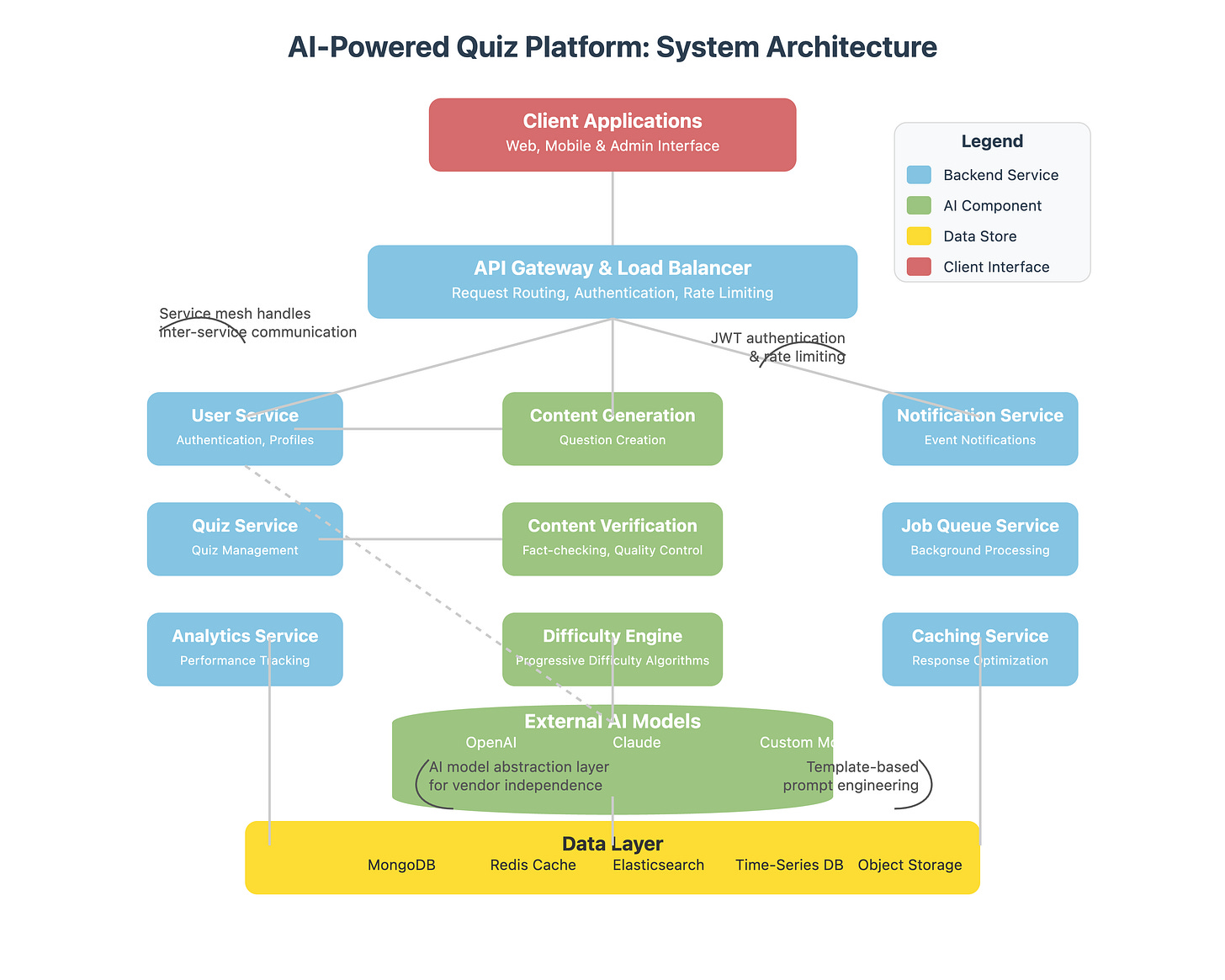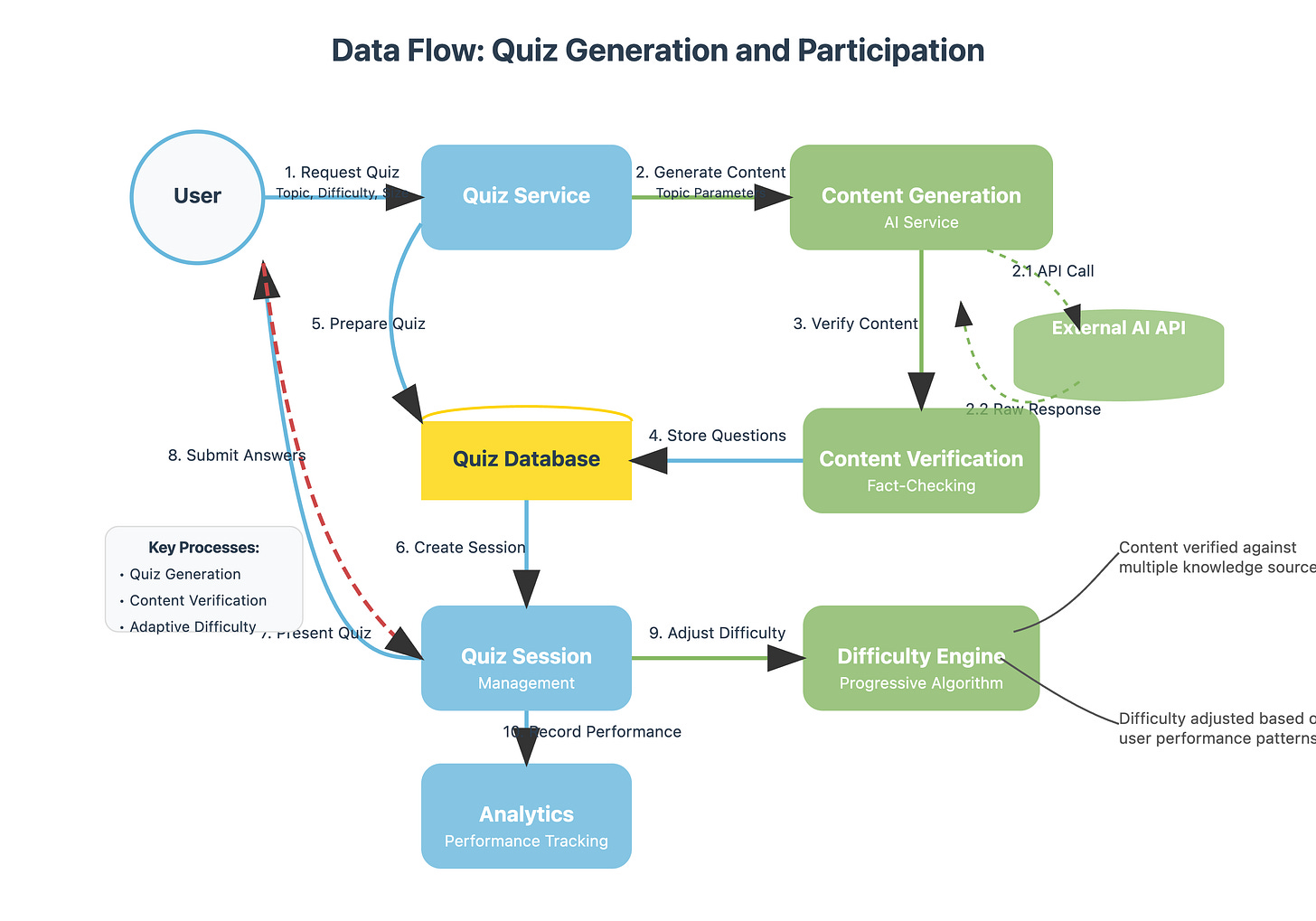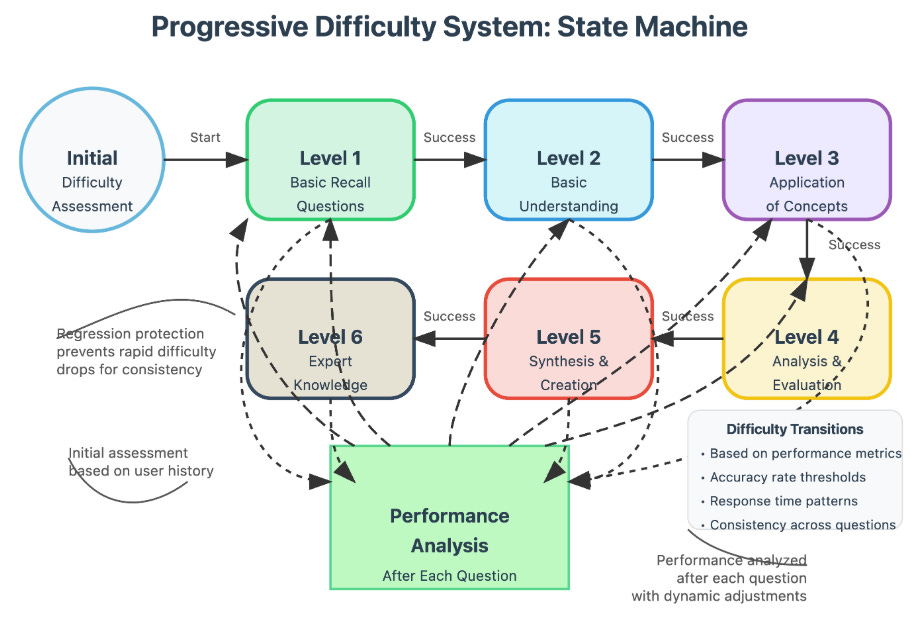Introduction
This intensive hands-on curriculum guides students through building a production-grade AI-powered quiz platform with emphasis on backend development, business logic, and software development lifecycle practices. Each day includes concrete coding exercises that build toward a functional application, following proper SDLC methodology.
Key Architectural Components
1. Backend Services
The architecture implements a microservices pattern with clearly defined responsibilities:
User Service: Handles authentication, user profiles, and session management
Quiz Service: Manages quiz creation, retrieval, and attempt tracking
Content Service: Orchestrates AI content generation and verification
Analytics Service: Processes user performance data and generates insights
Notification Service: Manages event notifications and alerts
Caching Service: Optimizes response times for frequently accessed content
2. AI Components
The AI subsystem is architected with multiple specialized components:
Content Generation Service: Transforms topics into structured quiz questions
Content Verification Service: Ensures factual accuracy and educational value
Difficulty Engine: Implements progressive difficulty algorithms
AI Model Abstraction Layer: Provides vendor-independence for AI services
3. Data Flow Design
The data flow follows a structured pattern:
User requests a quiz on a specific topic
Quiz service initiates content generation through the AI service
AI generates questions using external models with optimized prompts
Content verification ensures accuracy and educational value
Verified questions are stored in the database
Quiz session is created with progressive difficulty settings
User interacts with questions in sequence
Performance is analyzed to adjust difficulty dynamically
Analytics service records performance metrics for future sessions
4. Progressive Difficulty Implementation
The state machine for difficulty progression shows:
Initial assessment of user knowledge level
Six progressive difficulty levels from basic recall to expert knowledge
Continuous performance analysis after each question
Dynamic difficulty adjustments based on performance patterns
Protection against rapid difficulty changes to maintain learning engagement
Technology Stack and Implementation Considerations
Backend Technologies
Node.js/Express: Primary backend platform
MongoDB: Document database for flexible schema evolution
Redis: Caching layer for performance optimization
ElasticSearch: For search capabilities and analytics
JWT: Token-based authentication
AI Integration
OpenAI/Claude APIs: External AI models for content generation
Custom Model Integration: For specialized educational content
Prompt Templates: Standardized templates for consistent outputs
Caching Strategy: To optimize AI inference costs and performance
DevOps and Infrastructure
Docker: Containerization for consistent environments
Kubernetes: Orchestration for scaling and management
CI/CD Pipeline: Automated testing and deployment
Monitoring Stack: Comprehensive system observability
This architecture provides a solid foundation for implementing the 60-day learning plan, with a focus on backend development, business logic, and the integration of AI capabilities for an educational quiz platform.
Learning Objectives
By completing this 60-day program, you will:
Master backend architecture and business logic implementation for AI applications
Develop practical skills in database design, API development, and system integration
Gain hands-on experience with the complete software development lifecycle
Build a production-ready AI quiz platform with progressive difficulty features
Learn DevOps practices for deploying and maintaining backend services
Day-by-Day Learning Plan
Week 1: Project Setup and Backend Foundations
Day 1: Requirements Analysis and Project Setup
Theory: Software Development Lifecycle overview and requirements gathering
Coding Exercise: Create a detailed requirements document with functional/non-functional requirements for the quiz platform
Technical Task: Set up development environment (Node.js, Git, VS Code) and initialize GitHub repository with proper structure
Day 2: System Architecture Design
Theory: Backend architecture patterns and microservices
Coding Exercise: Design and document system architecture diagram with all components
Technical Task: Create folder structure for backend services with RESTful API patterns
Day 3: Database Schema Design
Theory: Data modeling and relationships for quiz applications
Coding Exercise: Create complete Entity-Relationship Diagram for the platform
Technical Task: Implement MongoDB schemas for users, quizzes, questions, and attempts with proper validation
Day 4: User Authentication Service
Theory: Authentication flows and security best practices
Coding Exercise: Implement JWT-based authentication with password hashing
Technical Task: Build registration, login, and session management endpoints with proper error handling
Day 5: Core Quiz Service - Data Layer
Theory: Repository pattern and data access layers
Coding Exercise: Implement quiz repository with CRUD operations
Technical Task: Create database queries with indexing optimization for quiz retrieval
Day 6: Core Quiz Service - Business Logic
Theory: Business logic separation and service layer patterns
Coding Exercise: Implement quiz service with business rules for creation and retrieval
Technical Task: Build quiz management endpoints with validation and error handling
Day 7: Quiz Session Management
Theory: Stateful vs. stateless session management
Coding Exercise: Design and implement quiz attempt tracking service
Technical Task: Create endpoints for starting, saving, and completing quiz attempts
Week 2: AI Integration - Backend Focus
Day 8: AI Service Architecture
Theory: Integration patterns for AI services
Coding Exercise: Design AI service architecture with proper separation of concerns
Technical Task: Implement service skeleton with OpenAI API integration
Day 9: Prompt Engineering Framework
Theory: Systematic prompt construction and template management
Coding Exercise: Build a template management system for AI prompts
Technical Task: Create prompt templates for different question types with variables
Day 10: Question Generation Service
Theory: Asynchronous processing for content generation
Coding Exercise: Implement question generation service with retry logic
Technical Task: Build endpoint that accepts topic and returns generated questions
Day 11: Content Verification Service
Theory: AI output validation and quality control
Coding Exercise: Design and implement content verification pipeline
Technical Task: Create verification service that checks factual accuracy and format
Day 12: Topic Analysis Service
Theory: NLP techniques for topic extraction and categorization
Coding Exercise: Implement topic analysis and categorization service
Technical Task: Build endpoint that extracts subtopics and related concepts from input
Day 13: AI Model Abstraction Layer
Theory: Vendor-agnostic AI integration design
Coding Exercise: Implement adapter pattern for multiple AI providers
Technical Task: Create abstraction layer that works with different AI service providers
Day 14: AI Service Testing Framework
Theory: Testing strategies for AI-powered services
Coding Exercise: Build automated testing framework for AI-generated content
Technical Task: Implement unit and integration tests for the AI services
Week 3: Core Business Logic
Day 15: Question Difficulty Classification
Theory: Computational approaches to difficulty assessment
Coding Exercise: Implement difficulty classification algorithm
Technical Task: Create service that analyzes and assigns difficulty levels to questions
Day 16: Progressive Difficulty Algorithm - Design
Theory: Adaptive learning algorithms and difficulty progression
Coding Exercise: Design progressive difficulty algorithm with clear rules
Technical Task: Document algorithm with flowcharts and pseudocode
Day 17: Progressive Difficulty Algorithm - Implementation
Theory: Algorithm implementation and performance considerations
Coding Exercise: Implement progressive difficulty service
Technical Task: Create endpoint that returns questions in difficulty sequence
Day 18: Quiz Scoring Engine
Theory: Scoring algorithms and normalization techniques
Coding Exercise: Implement comprehensive scoring system with weighting
Technical Task: Build scoring service with different scoring strategies
Day 19: Performance Analytics Engine
Theory: Educational analytics and performance metrics
Coding Exercise: Implement analytics processing service
Technical Task: Create data aggregation endpoints for user performance
Day 20: Topic Relationship Mapping
Theory: Knowledge graphs and relationship modeling
Coding Exercise: Design and implement topic relationship service
Technical Task: Build API that returns related topics with relationship types
Day 21: Learning Path Generator
Theory: Curriculum sequencing and learning path algorithms
Coding Exercise: Implement learning path generation service
Technical Task: Create endpoint that returns optimized topic sequence
Week 4: Advanced Backend Features
Day 22: Caching Strategy Implementation
Theory: Caching patterns and invalidation strategies
Coding Exercise: Design and implement caching layer for quiz content
Technical Task: Add Redis caching to high-traffic endpoints with proper TTL
Day 23: Rate Limiting and Request Throttling
Theory: API protection and resource management
Coding Exercise: Implement rate limiting middleware
Technical Task: Add tiered rate limits for different API endpoints
Day 24: Logging and Monitoring Service
Theory: Application observability and log management
Coding Exercise: Implement structured logging system
Technical Task: Add comprehensive logging to all services with context
Day 25: Error Handling Framework
Theory: Robust error handling patterns and error normalization
Coding Exercise: Design and implement error handling framework
Technical Task: Add global error handler with proper response formatting
Day 26: Background Job Processing
Theory: Asynchronous job processing and scheduling
Coding Exercise: Implement job queue for long-running tasks
Technical Task: Create worker service for processing content generation jobs
Day 27: Notification Service
Theory: Event-driven architecture and notification patterns
Coding Exercise: Design and implement notification service
Technical Task: Create endpoints for managing notification preferences and delivery
Day 28: Data Export Service
Theory: Data serialization and export formats
Coding Exercise: Implement configurable data export service
Technical Task: Create endpoints for exporting quiz results in multiple formats
Week 5: API Integration and Testing
Day 29: API Documentation
Theory: API documentation standards and tools
Coding Exercise: Implement OpenAPI specification for all endpoints
Technical Task: Generate interactive API documentation with Swagger
Day 30: API Versioning Strategy
Theory: API versioning approaches and backward compatibility
Coding Exercise: Implement API versioning system
Technical Task: Refactor endpoints to support multiple versions
Day 31: Unit Testing - Services
Theory: Unit testing principles and mocking
Coding Exercise: Write comprehensive unit tests for business logic
Technical Task: Achieve 80% test coverage for core services
Day 32: Integration Testing - API
Theory: Integration testing strategies
Coding Exercise: Create integration test suite for API endpoints
Technical Task: Implement automated test pipeline for API validation
Day 33: Load Testing and Performance
Theory: Load testing methodologies and tools
Coding Exercise: Design and implement load testing scripts
Technical Task: Conduct load tests and optimize bottlenecks
Day 34: Security Testing
Theory: API security testing and vulnerability assessment
Coding Exercise: Implement security tests for authentication and authorization
Technical Task: Conduct security audit and fix identified issues
Day 35: End-to-End Testing
Theory: E2E testing approaches for backend systems
Coding Exercise: Create end-to-end test scenarios
Technical Task: Implement automated E2E tests for critical flows
Week 6: DevOps and Infrastructure
Day 36: Environment Configuration
Theory: Environment management and configuration
Coding Exercise: Implement environment-based configuration system
Technical Task: Create development, testing, and production configurations
Day 37: Containerization with Docker
Theory: Container principles and implementation
Coding Exercise: Create Dockerfiles for all services
Technical Task: Build and test Docker images for application components
Day 38: Docker Compose Setup
Theory: Multi-container applications with Docker Compose
Coding Exercise: Create Docker Compose configuration
Technical Task: Run complete application stack with Docker Compose
Day 39: CI Pipeline with GitHub Actions
Theory: Continuous Integration principles and implementation
Coding Exercise: Create CI workflow configuration
Technical Task: Set up automated build and test pipeline
Day 40: CD Pipeline for Backend Services
Theory: Continuous Deployment strategies
Coding Exercise: Create CD workflow configuration
Technical Task: Implement automated deployment for backend services
Day 41: Database Backup and Recovery
Theory: Data backup strategies and disaster recovery
Coding Exercise: Implement database backup scripts
Technical Task: Create automated backup and recovery system
Day 42: Monitoring and Alerting
Theory: Application monitoring and alerting systems
Coding Exercise: Set up monitoring for backend services
Technical Task: Implement alerting for critical service metrics
Week 7: Minimal Frontend and Integration
Day 43: API Integration Layer
Theory: Frontend-backend integration patterns
Coding Exercise: Create API client library with proper error handling
Technical Task: Implement API integration layer for frontend
Day 44: User Authentication Flow
Theory: Authentication flow in frontend applications
Coding Exercise: Implement authentication components
Technical Task: Create login and registration pages with validation
Day 45: Quiz Management Interface
Theory: CRUD operations in frontend applications
Coding Exercise: Implement quiz management components
Technical Task: Create quiz creation and management pages
Day 46: Quiz Taking Interface
Theory: Interactive quiz interfaces and state management
Coding Exercise: Implement quiz session components
Technical Task: Create question presentation and submission flow
Day 47: Results and Analytics Interface
Theory: Data visualization for educational applications
Coding Exercise: Implement analytics dashboard components
Technical Task: Create performance visualization pages
Day 48: Error Handling and Loading States
Theory: User experience for asynchronous operations
Coding Exercise: Implement error boundary and loading components
Technical Task: Add error handling and loading states to all pages
Day 49: End-to-End Integration
Theory: Full stack integration strategies
Coding Exercise: Complete frontend-backend integration
Technical Task: Test and fix integration issues
Week 8: Performance Optimization and Advanced Features
Day 50: Database Query Optimization
Theory: Database performance tuning techniques
Coding Exercise: Analyze and optimize database queries
Technical Task: Implement database indexing and query refactoring
Day 51: API Response Optimization
Theory: API performance optimization strategies
Coding Exercise: Implement response compression and optimization
Technical Task: Measure and improve API response times
Day 52: Memory Management Optimization
Theory: Server memory optimization techniques
Coding Exercise: Analyze and fix memory usage issues
Technical Task: Implement memory profiling and optimization
Day 53: Connection Pooling and Resource Management
Theory: Connection management and resource utilization
Coding Exercise: Implement connection pooling for database and external services
Technical Task: Configure and optimize resource limits
Day 54: Multi-Model Quiz Generation
Theory: Hybrid AI model approach for content generation
Coding Exercise: Implement multi-model generation strategy
Technical Task: Create service that uses different models for different question types
Day 55: Content Curation Workflow
Theory: Human-in-the-loop systems for content quality
Coding Exercise: Implement content curation workflow
Technical Task: Create admin interface for content review and approval
Day 56: Automated Content Refreshing
Theory: Content lifecycle management strategies
Coding Exercise: Implement automated content refresh service
Technical Task: Create scheduled jobs for content updates
Week 9: Final Integration and Deployment
Day 57: Production Environment Setup
Theory: Production deployment architecture
Coding Exercise: Configure production environment
Technical Task: Set up production infrastructure with scaling
Day 58: Final Security Audit
Theory: Comprehensive security audit process
Coding Exercise: Conduct security testing and fixes
Technical Task: Implement security recommendations
Day 59: Documentation Finalization
Theory: System documentation best practices
Coding Exercise: Create comprehensive API and system documentation
Technical Task: Document deployment and maintenance procedures
Day 60: Final Deployment and Project Review
Theory: Production deployment checklist
Coding Exercise: Execute production deployment
Technical Task: Conduct post-deployment verification and testing
Technical Stack
Backend Focus:
Core Backend: Node.js with Express or NestJS
Database: MongoDB with Mongoose
AI Integration: OpenAI API with custom abstraction layer
Authentication: JWT-based authentication
Testing: Jest, Supertest for API testing
DevOps: Docker, GitHub Actions
Monitoring: Winston/Pino for logging, Prometheus for metrics
Minimal Frontend:
Framework: React with minimal setup
State Management: React Context or Redux
API Integration: Axios with custom client
Daily Workflow
Each day should follow this structured workflow:
Morning: Study theory and plan implementation (1 hour)
Development: Implement the day's coding exercise (2-3 hours)
Testing: Write tests and verify functionality (1 hour)
Documentation: Document what you've built and learned (30 minutes)
Review: Commit code with proper messages and review the day's work (30 minutes)
Implementation Guidelines
Follow SDLC Principles:
Document requirements before coding
Design before implementation
Test thoroughly after coding
Review and refactor regularly
Source Control Best Practices:
Create feature branches for each day's work
Write meaningful commit messages
Use pull requests for major features
Review code before merging
Code Quality Standards:
Follow consistent coding standards
Write clear comments and documentation
Create reusable and modular code
Implement proper error handling
Testing Strategy:
Write unit tests for all business logic
Create integration tests for API endpoints
Implement end-to-end tests for critical flows
Automate testing in CI pipeline
This comprehensive curriculum balances theoretical knowledge with intensive hands-on practice, focusing on backend development and business logic implementation. By following this day-by-day plan, you'll gain practical experience with the entire software development lifecycle while building a sophisticated AI-powered quiz platform.





